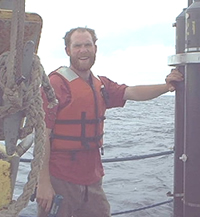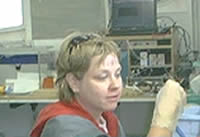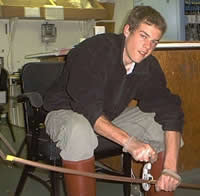| |
| |

Peter McAuliffe was instrumental in the
deployment and recovery of
many the casts and tow-yo's.

Angie Opiola in the ship's science
lab analyzing water column samples for pH.
 David Farr cutting up copper tubing
for the helium samples.
David Farr cutting up copper tubing
for the helium samples.
|
|
Teacher Logbook - R/V Wecoma
Missy
Holzer 's Sealog:
CTD Cruise Day 16
Weather at 1630 hours PDT:
Weather at 1630 hours PST: Cloudy skies with
winds of 14 knots from the
northwest, and visibility of 12 miles. Barometric pressure is 1020.2 mb,
and the temperature is 59O Fahrenheit. Ocean swells are 4 feet out of
the
northwest, and the seas are 2 feet out of the northwest.
It's 0200
hours and it's time for a cast? Whether it's 0200 hours or 1400 hours,
science on board an oceanographic vessel doesn't stop because the sun
went down. Science occurs around the clock on the NeMO CTD Cruise thanks
to having capable staff on each of the watches. Joining the staff this
year on the R/V Wecoma are a few students that are helping out in all
aspects of the data acquisition from the casts and tow-yo's. After adjusting
to the motions of the ship, Peter McAuliffe, Angie Opiola, and David Farr
have been a tremendous help in the lab and on the deck.
A 2001 graduate
from Carleton College in Northfield, MN, Peter McAuliffe is back for a
second year with the NOAA-PMEL Vents Program. Last year as Peter was finishing
his coursework for obtaining his BS on geology he came on board to gather
research for his senior thesis. He enjoyed the work immensely, and was
delighted to be coming back on board for a second year, as was the science
staff when they knew they were getting him back to pitch in. From his
experiences of doing science on a ship in the ocean he realizes that fieldwork
takes a lot of planning and foresight because research science is unpredictable.
He also noticed that research is a slow process where the results aren't
evident until the data is analyzed back on shore. Peter noted a couple
of significant challenges while out at sea: 1. You have to be emotionally
ready to be out in the confines of a ship away from all the things you
are used to, and 2. Even though the work can be repetitious, the work
cannot be looked at as repetitious while working around the heavy equipment.
One of Peter's memories from being out at sea is the beauty and grandiose
nature of the ocean, and that we are merely "a cork bobbing in a
big pond" at the mercy of the ocean. He feels that this opportunity
wouldn't be nearly as beneficial if it wasn't for the support of the staff
and crew, and there willingness to be patient with his inexperience. The
rest of the summer for Peter will be set aside for making some career
decisions, and getting back to the Seattle area to do the things he enjoys
like spending time with family, friends, and his girlfriend, playing sports
like soccer, playing percussion, and spending time outdoors.
Angie Opiola
has never been out to sea and saw how joining the staff on the NeMO CTD
Cruise would be a great experience, as well as an opportunity to develop
some contacts for the future. Angie is a May graduate from DePaul University
in Chicago where she acquired a BS in Environmental Science. While on
the R/V Wecoma she has worked predominately as Dr. Joe Resing's research
assistant where one of her roles is to calculate the pH of the hundreds
of water column samples acquired on the cruise. There is electronic instrumentation
on board that calculates the pH by using a combination of a millivolt
reading and a temperature reading, and Angie is the one carefully using
the probes to facilitate this operation. Angie, like Peter, recognized
that fieldwork in the ocean can be a challenge, and that having 2 of everything
is a necessity. She noticed that nothing goes as planned as far as the
schedule goes; the work is either ahead of schedule or behind schedule,
but there is always something to do so that time can be used wisely. One
of the challenges that Angie met while working in the lab was getting
familiar with the equipment and lab procedures, and trying to avoid contaminating
the samples. She was captivated on how great everyone has been, and kind
of thankful to realize that scientists can have a sense of humor. Something
that will stand out in her memory of working out at sea is that she was
on the boat constantly working with the same people day in and day out.
She feels that life on the ocean is wonderful and a great change of pace
being out in the middle of nowhere. Angie will be looking forward to get
back on land where she'll be able to walk and run for miles, as well as
spend time with her family and friends. The balance of the summer will
be devoted to wrapping up her senior thesis, possibly going on a vacation,
and preparing to move to Wisconsin where she'll be attending graduate
school at the University of Wisconsin in Green Bay to major in Environmental
Science and Policy. She plans on a career in research, but hopes to channel
it an area of an environmental concern or in environmental restoration.
Often parents
are pushing their teenage children out the door in the summer and telling
them to get busy doing something. David Farr is not one of those teens
that needed a push. A junior at Ballard High School in Seattle, David
is the youngest participant on the NeMO CTD Cruise where he's helping
the science staff in most capacities of data acquisition and data entry.
David was looking forward to the experience of being out at sea, but had
no idea about what he was getting himself into. He thought the world of
science in the field meant for the most part that data was predominately
collected by hand data, and was surprised to see how much of it is actually
acquired through the use of computers. David has been out on the deck
deploying the CTD, and gathering water samples, and has been in the lab
performing data entry and assisting Chemist Ron Greene in preparing the
copper tubing used for gathering helium samples. Before he came on board
David was unsure about how science was actually "done," but
now he may even chose a career that entails a bit of fieldwork. One of
the challenges that he faced while out on the R/V Wecoma was getting used
to how rough it can actually get out at sea, as well as how vast the ocean
actually is. A lasting memory for him will be the work he did in deploying
and recovering the CTD as well as the< motions of the ocean under the
ship. David is looking forward to getting home to his family, eating Mexican
food, playing basketball, playing piano, and getting sleep at night (David
had the 0000 hours to 1200 hour watch). The rest of the summer will find
him with his church youth group building a home with Habitat for Humanity,
and camping with his family in the Cascades.
The enjoyment
and success of the cruise was in part due to the positive enthusiasm of
the students on board. Their experiences on the NeMO CTD Cruise provided
them with a golden opportunity to participate in research science, and
a number of memories that will last forever. Peter, Angie, and David are
to be commended for all the work in helping out their watch crews.
|
|

